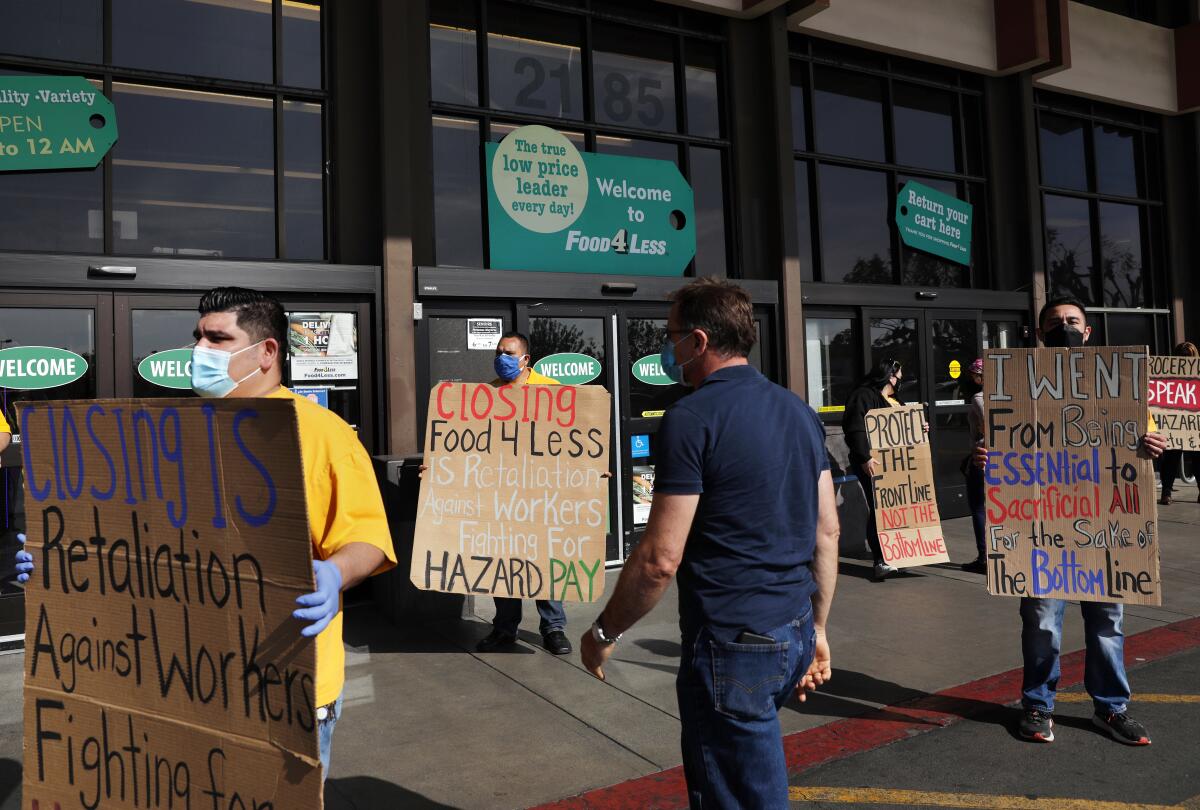Ralphs and Food 4 Less locations to close in Los Angeles over hazard pay rules

- Share via
Supermarket-chain owner Kroger said it will close three stores in Los Angeles in response to new rules requiring a $5-per-hour pay bump for grocery workers during the pandemic, the latest round of closures it has announced since “hero pay” mandates emerged earlier this year.
Two Ralphs, one on West Pico Boulevard and one on West Slauson Avenue, as well as a Food 4 Less on West Sunset Boulevard, are slated for closure on May 15, Kroger said in a statement Wednesday. The company called the three stores “underperforming” and said the new L.A. city-ordered pay boosts sped up the decision to shut them down.
The Kroger announcement comes as businesses continue to argue, some in court, that the extra pay is too costly to sustain and that the ordinance unfairly singles out grocers when there are other businesses employing front-line workers. The L.A. City Council voted 14 to 1 on Feb. 24 to require larger grocery stores and drugstores to boost their workers’ pay by $5 an hour for the next four months.
Kroger said pay bumps for workers will add $20 million in operating costs over that period, making it “financially unsustainable” to keep underperforming stores in operation.
“Unfortunately, the Los Angeles City Council disregarded their own Economic Impact Report by not considering that grocery stores — even in a pandemic — operate on razor-thin profit margins in a very competitive landscape,” the company said.
An analysis released by the city days before the vote noted that the grocery industry is a low-profit-margin sector and warned that companies could respond to the ordinance by closing stores, laying off staff or raising food prices. Experts say grocery stores should generally be able to absorb temporary pay boosts, though already-struggling stores could be more adversely affected.
Stuart Waldman, president of the Valley Industry and Commerce Assn., said, “these exclusive and rushed provisions are simply bad policies that will have lasting negative effects on our city.” His statement also thanked front-line workers.
Locals said they were concerned about the impending loss of the grocery stores. Denise Francis Woods, who ran unsuccessfully for City Council to represent part of South L.A. last year, said closing the store on Slauson would cost people in the community their jobs and deprive the area of a needed grocery store.
“That would be a total disaster for us if that Ralphs was to leave,” she said. “We’re considered a food desert.”
City Councilman Paul Koretz, who voted for the extra-pay mandate, grew up shopping at the Ralphs on Pico, then an Alpha Beta store. The Kroger moves aim to “bully other cities” considering passing similar pay requirements, he said in an interview.
Long Beach became one of the first cities in California to pass hazard pay rules, approving an ordinance mandating an extra $4 an hour for grocery workers in late January. Backlash was swift, with the California Grocers Assn. launching a lawsuit against the ordinance in federal court.
Other jurisdictions that have approved similar proposals, including San Jose, San Francisco and Montebello, have also seen pushback from trade groups.
Last month, Kroger announced the impending closure of a Ralphs and Food 4 Less in Long Beach, blaming the new pay boosts. Kroger also announced plans to close two stores in Seattle after the city passed a hazard pay mandate; the two Quality Food Centers slated for closure were already underperforming, the company said.
A UC San Francisco study on mortality rates among workers during the pandemic has informed the hazard pay legislation. The study found that of the front-line labor force, food and agriculture workers faced the highest increase in death. Latino food and agriculture workers were disproportionately affected, experiencing a 59% increase in mortality.
Times staff writer David Zahniser contributed to this report.
More to Read
Inside the business of entertainment
The Wide Shot brings you news, analysis and insights on everything from streaming wars to production — and what it all means for the future.
You may occasionally receive promotional content from the Los Angeles Times.












